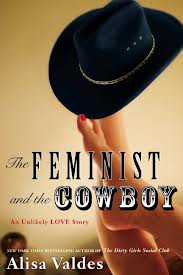No Shaming This Shrew
Alisa Valdes is a prolific journalist, blogger and author. Fearless when it comes to writing about herself and affairs of the heart, she has fashioned a career of being an outspoken feminist. Self-reflection and self-disclosure can take an author far. It takes an extraordinarily life or talent, however, to do more than describe.
In the Feminist and the Cowboy, her latest book, Valdes recounts her turbulent relationship with a handsome New Mexico rancher of few words, a dominant personality, and a cleft chin. Part memoir and part polemic on gender roles and identity, the book is a first-hand account of a slow-moving train wreck of a relationship written by a passenger in first class. She’s a liberal feminists. He’s a libertarian Republican. She wears Uggs. He wears cowboy boots. Can they find love? It might be possible, but for the lovers’ respective problems and conflicts. Valdes is high-functioning and consistently self-destructive. The cowboy is controlling and damaged.
Shortly after the book was published, Valdes revealed that her romance with the cowboy had ended. She then briefly posted and quickly pulled down an account of abuse at the hands of the Cowboy. It was not rape, she later attested, but many in the blogosphere disagreed. In fact, the post-publication woes of Valdes generated a high-number of blogs, comments and articles (See here , here and here).
I have no desire to write about Valdes’ love life, past or present. If that interests you, read the book. I found it frustrating, entertaining, and shallow. It is neither profound nor substantial, and suffers from a “just written” feel. But Valdes’ talent is keeping the attention on her and the discussion about her going. In fact, her gift is an ability to turn self-absorption into a career. It may only be the knowledge that at the age of 40 she was living in her father’s house and dating a control freak that keeps one from jealousy.
Why do so many of us pay attention? Because Valdes’ open and trusting narrative, her raw emotions, her lightly edited vacillations, echo the language of an old friend. For a traditional memoir, unedited connotes sloppy. For a blogger/journalist/author, an unedited memoir means that nothing is held back. Valdes is definitely not discreet.
So many of us work too hard, run around too much, and simply lack the time and opportunity for sustained interaction with friends. Humans are social animals, though – there is no denying our nature – and we want friendship and trust. Valdes offers her story couched in the familiar language, structure and genre of a friend.She trusts, she cajoles, she argues and she explains. You can almost hear the pauses in the text where she waits for us to nod, to ask a question (“you did what!?”), and to console. Valdes is well-practiced in the perfect genre for an age with few rules protecting privacy and no meaningful understanding of intimacy.
David Potash